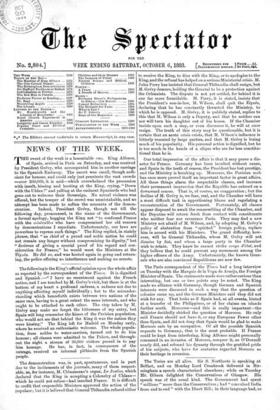The demonstration was, in part, spontaneous, and in part due
to the incitements of the journals, many of them respect- able, as, for instance, It. Clemencean's organ, La Justice, which declared that the King in accepting a Colonelcy of Uhlans- which he could not refuse—had insulted France. It is difficult to credit that responsible Ministers approved the action of the populace; but it is believed that General Thibaudin refused either to receive the King, to dine with the King, or to apologise to the King, and the refusal has helped on a serious Ministerial crisis. M. Jules Ferry has insisted that General Thibaudin shall resign, but M. Grevy demurs, holding the General to be a protection against the Orleanists. The dispute is not yet settled, for behind it is one far more formidable. M. Ferry, it is stated, insists that the President's son-in-law, It. Wilson, shall quit the glysde, declaring that he has constantly thwarted the Ministry, to which he is opposed. M. Grevy, it is publicly stated, replies to this that M. Wilson is only a Deputy, and that he neither can nor will turn his daughter out of his house. If the Chamber insists upon such a step, or even discusses it, he will at once resign. The truth of this story may be questionable, but it is certain that an acute crisis exists, that M. Wilson's influence is bitterly resented by large parties, and that M. GriSvy is losing much of his popularity. His personal action is dignified, but he is too much in the hands of a clique who are far less constitu- tional than he is.


































